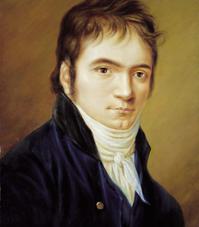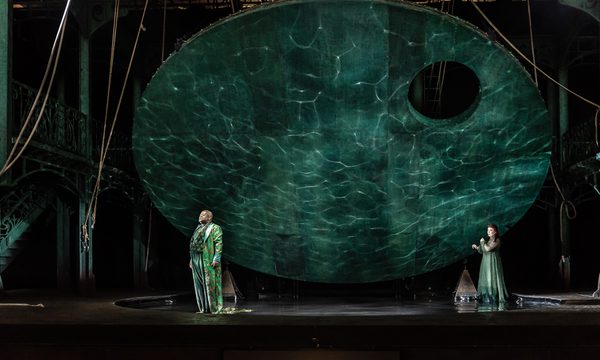
News Story
First things first – what is Beethoven's Fifth Symphony all about?
Ludwig van Beethoven produced an awe-inspiring body of work in his 57 years, including nine symphonies. The fifth is also sometimes referred to as the Symphony of Fate, but you’ll more often hear it billed under its numerical title.
The first four notes alone are instantly recognisable – possibly the most famous introduction to any piece of classical music in the world – but there’s so much more to this symphony beyond its iconic opening motif.
Where have I heard this before?
Beethoven’s Fifth Symphony is also often referred to as the best-known symphony in the world, for good reason. First played in Vienna in 1808, it has since been heard all around the world, performed by world-renowned orchestras under legendary conductors, and featured in more films, television programmes and adverts than even the most exhaustive Wikipedia listing can cover. It’s been animated by Disney in Fantasia 2000, whistled by a teen rebel in The Breakfast Club, turned into a disco classic in Saturday Night Fever and underscored climactic moments in The King’s Speech and Elysium. During the Second World War, those first four notes were used to introduce BBC broadcasts in the UK, as a subtle nod to the Allies’ ‘V for Victory’ slogan – the rhythm of those first four notes echoes the Morse code for ‘V’.

Portrait of Ludwig van Beethoven
© 1803 Christian HornemannSo what’s it about?
As you’d expect for such an iconic piece of music, there’s more than one interpretation. Beethoven spent four years composing the piece, during which time the Napoleonic Wars raged across Europe and Beethoven’s hearing became increasingly worse, cutting short his career as a celebrated pianist. These external and internal influences have both been cited as potential catalysts for the symphony’s relentless sense of power and purpose.
Beethoven himself supposedly responded to a question about the meaning of those first four notes with the sombre statement: ‘This is the sound of fate knocking at the door.’ This could’ve referred to his own fate, as he came to terms with the tinnitus and hearing loss that at one point left him almost suicidal, or to the fate of European nations, as they reckoned with the continent-wide repercussions of the French Revolution and Napoleon’s rise to power. Whether or not Beethoven truly described the introduction in this way, it strikes a chord with how thousands of later listeners have interpreted the symphony, reinforcing its associations with heroic struggle, revolutionary fervour and triumphant victory.
How did the premiere go?
Not well. It was first played as part of a programme of new works by Beethoven, which ran to over four hours, outside, in December, in Austria. Already a longer and considerably colder concert than many had anticipated, an under-rehearsed orchestra didn’t help things. However, extracted from the surrounding chaos of that first performance, the symphony soon gained popularity and entered the repertoires of orchestras around the world. It’s also become something of a festival favourite over our 75 years, performed by the Royal Philharmonic Orchestra, Royal Concertgebouw Orchestra, the Berliner Philharmoniker and the BBC Scottish Symphony Orchestra, among others.
Who’s performing it?
The Philadelphia Orchestra are taking on this iconic piece under the baton of their Music Director, Yannick Nézet-Séguin. The Philadelphia Orchestra is one of the ‘Big Five’ orchestras of the United States, known since the 1950s as leaders in the classical music world. It has a history of breaking new ground, being the first symphonic orchestra to make electrical recordings (in 1925), the first to perform on the soundtrack of a feature film (Paramount’s The Big Broadcast of 1937), the first to appear on a national television broadcast (in 1948, on CBS), and the first major orchestra to broadcast a concert live online (in 1997).
To this day, the orchestra continues to push boundaries in the world of classical music, with Vice President of Artistic Planning Jeremy Rothman saying it is committed to ‘challenging expectations of what an orchestra concert can be’. The orchestra is also committed to championing diversity in its work, both in terms of the artists on the podium and on-stage and the composers whose music it performs.
Tell me about Yannick Nézet-Séguin
Yannick Nézet-Séguin has led The Philadelphia since 2012. The 2021-22 season marks his 10th season as Music Director. Nezet-Seguin has been pivotal in promoting diversity in the orchestra’s programming, including championing the rediscovered music of long-overlooked composer Florence Price.
Nézet-Séguin is also passionate about improving the accessibility of classical music, which links to the work the orchestra does in reaching new audiences within its home community of Philadelphia. Nezet-Seguin recently spoke to The Times about the importance of reinventing the perception of classical music, stating: “If I have one mission in life, it’s that I want people to feel welcome to the music.”
One last question, how do I get my hands on tickets?
The Philadelphia Orchestra are playing Beethoven’s Fifth at the Usher Hall at 8pm on Thursday 25 August 2022. You can book your tickets online, or call our box office on 0131 473 2000. Or if you just can't wait, here's a live-streamed performance from the Philadelphia Orchestra, recorded in March 2020...


